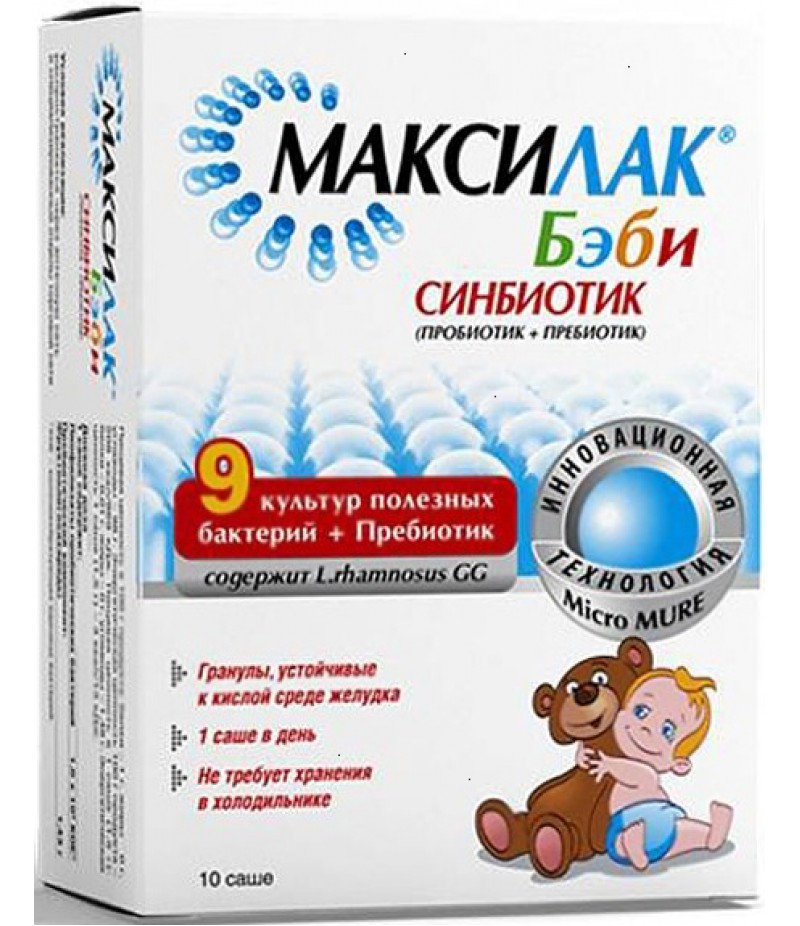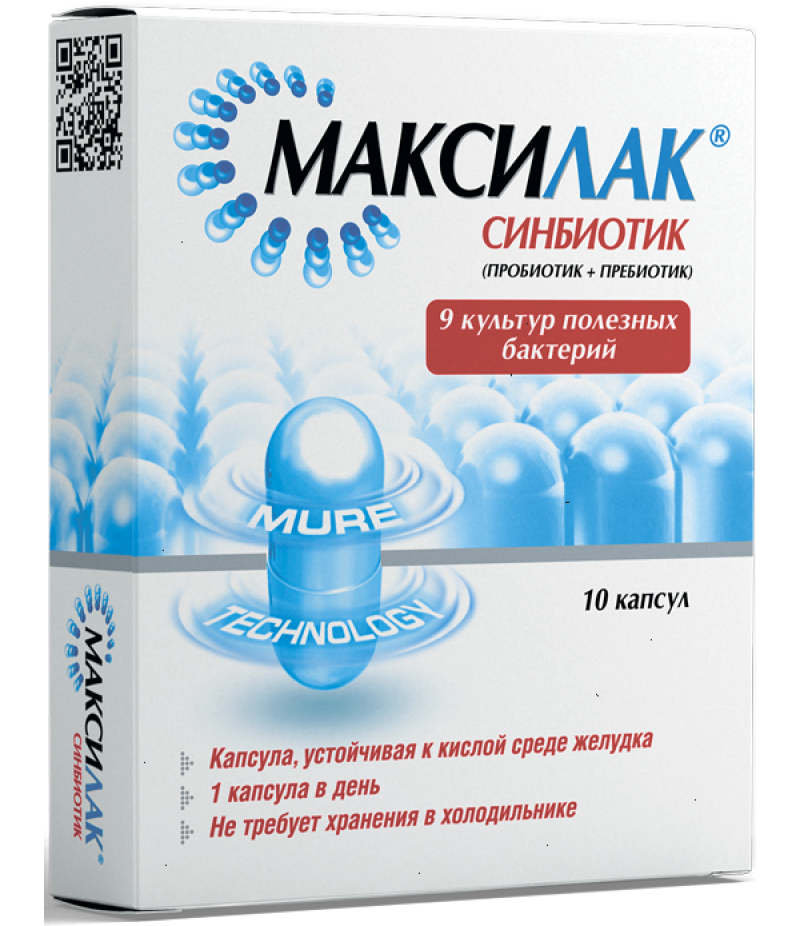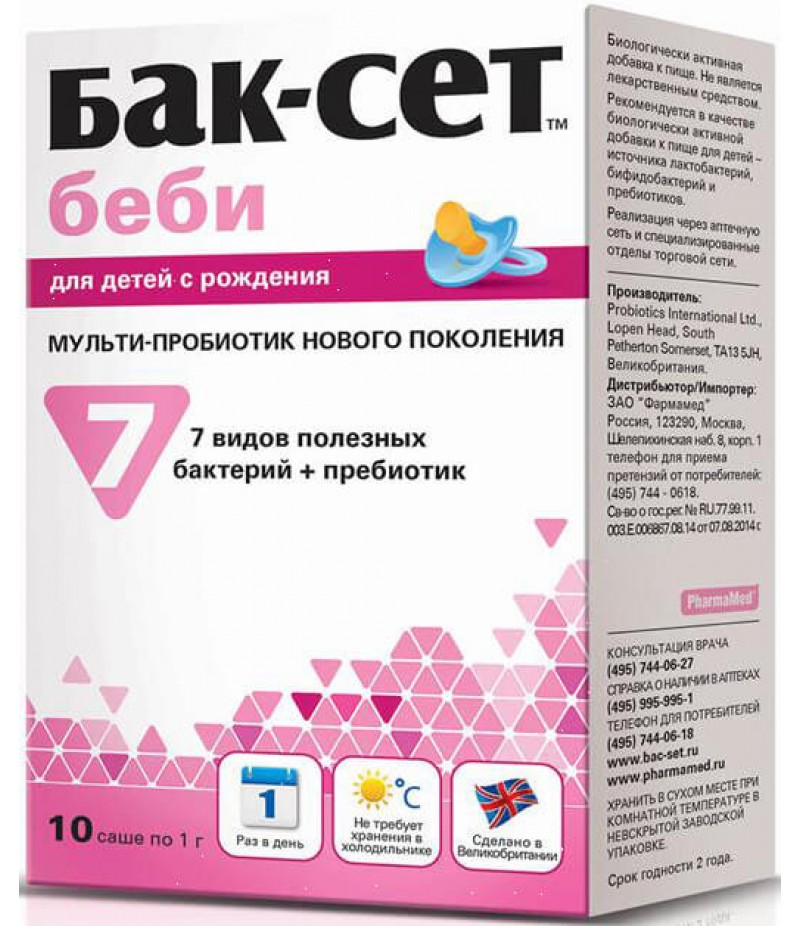Maxilac baby powder 1.5gr #10
- $29.77
- 3 or more $26.90
- Availability:In Stock
Maxilac baby instruction for useReed more and buy Maxilac baby on this pageForm of release, composition and packagingPowder 1 sachet / daily doselyophilisates of probiotic bacteria: 1 × 109 CFU *Lactobacillus acidophilus LA-14 1.1..
Maxilac baby instruction for use
Reed more and buy Maxilac baby on this page
Form of release, composition and packaging
Powder 1 sachet / daily dose
lyophilisates of probiotic bacteria: 1 × 109 CFU *
Lactobacillus acidophilus LA-14 1.11 × 108 cfu
Lactobacillus casei CBT (1) 1.11 × 108 cfu
Bifidobacterium lactis BL-04 1.11 × 108 cfu
Lactobacillus paracasei Lpc-37 1.11 × 108 CFU
Lactobacillus plantarum Lp-115 1.11 × 108 cfu
Lactobacillus rhamnosus GG 1.11 × 108 cfu
Lactobacillus salivarius Ls-33 1.11 × 108 cfu
Bifidobacterium bifidum BF-2 1.11 × 108 CFU
Bifidobacterium longum BG-7 1.11 × 108 cfu
prebiotic component: fructo-oligosaccharides 1.43 g
* CFU - a colony-forming unit of bacteria.
Excipients: corn starch.
Packing: 10 sachets.
pharmachologic effect
Biologically active food additive is not a medicine.
Synbiotic (probiotic + prebiotic)
Development and strengthening of the immunity of the child are associated with the formation of its intestinal microflora.
Microorganisms inhabit human organs and systems, beginning with his birth. The child, passing through the mother's birth canal, receives from her protective beneficial bacteria and this microbial population is one of the most important stages in the formation of normal gastrointestinal microflora. It is believed that children born by Caesarean section are more prone to infections, they later colonize the intestines with beneficial bacteria, and they are more likely to be prone to other diseases.
A less important stage in the formation of microflora is the period of breastfeeding. During this period of life, the child receives breast milk, which ensures the formation of normal intestinal microflora. The milk of the mother contains lactose, lysozyme, immunoglobulins, as well as bifidogenic components that promote the growth of bifidobacteria. All this - the irreplaceable components necessary for each baby to form a normal intestinal microflora. Already after the first year of life, the composition of the intestinal microflora of the child in quantitative and qualitative composition approaches the indicators of adults.
Why is it so important from the first days of a child's life to take care of the balance of the intestinal microflora?
The intestine is the largest defense system of the body, and its microflora performs many functions: it protects the intestines from the colonization of non-native bacteria, stimulates immunity, prevents the development of allergies (including atopic dermatitis) and inflammatory processes in the intestine, enhances the production of interferons, synthesizes vitamins group B, A, K, folic acid, reduces the intoxication of the body as a whole.
What factors can contribute to the disturbance of intestinal microflora?
- Cesarean section at delivery1
- Artificial feeding (infant formulas) 2
- Some medications
- Diarrhea
It is proved that some groups of drugs have a direct effect on the microflora of the gastrointestinal tract:
- antibiotics - successfully fight with pathogenic microorganisms, but at the same time kill useful bacteria. Every third case of antibiotic use causes diarrhea;
- non-steroidal anti-inflammatory drugs (including medicines containing paracetamol) - can cause damage to the mucous membrane of the stomach and intestines, lead to inflammation, ulceration and erosion4;
- antifungal agents - may have side effects such as decreased appetite, nausea, constipation or diarrhea, flatulence, pain in live 5.
The attack of diarrhea is accompanied by partial washing of microflora from the intestine of the child.
What are the symptoms of intestinal microflora disorder?
Symptoms of intestinal microflora disorders are: diarrhea (diarrhea), indigestion (constipation), constipation, flatulence (bloating), nausea, eructation, vomiting, discomfort and abdominal pain, etc.
One of the ways to form and restore microflora is to eat pro - and prebiotics.
Probiotics 6 - live microorganisms, representatives of human normoflora, correcting intestinal microflora (lacto- and bifidobacteria).
Prebiotics 6 - food ingredients, mainly oligosaccharides. When ingested into the large intestine, they promote the growth and development of normal intestinal microflora.
Synbiotics 6 - ingredients, a combination of pro and prebiotics. They have a mutually reinforcing effect on the metabolic processes in the human body.Maxilac Baby is the first and only symbiotic7, which contains 9 (nine) cultures of beneficial bacteria in the concentration necessary for the intestines of the child - 1 billion (1 × 109) CFU8. Maxilac Baby's Cynbiotic helps to restore and normalize intestinal microflora in children (from 4 months), especially in situations involving the use of drugs that disrupt the balance of the baby's microflora.
Contained in the synbiotic Maxillac Baby lactobacillus suppress the growth of pathogenic microflora, provide a protective function of the body and naturally strengthen immunity.
Bifidobacteria, which are also part of Maxillac Baby's symbiotic, are involved in the synthesis of amino acids, proteins and vitamins, enhance the absorption of calcium, iron, and vitamin D.
Fructooligosaccharides (prebiotic in Maxilac Baby) stimulate the rapid multiplication of beneficial bacteria and inhibit the development of pathogens, reduce the contamination of the intestine with toxins and improve its work, stimulate peristalsis, purify from slags, serve to prevent constipation and diarrhea, and promote the normalization of GIT functions. Maxilac Baby is a synbiotic specially created for children and produced in the form of lyophilizate, the granules of which are protected by Micro MURE technology (Multi Resistant Encapsulation10). This technology protects the pellets of Maxilak Baby from the influence of factors of the internal and external environment, due to which the majority of probiotic bacteria in the Maxilak Baby composition enter the intestine, and does not dissolve in the stomach, which has a positive effect on the recovery of the gastrointestinal microflora. the concentration of colonies of microorganisms increases from the stomach to the large intestine.
Maxilac Baby does not contain casein and preservatives, so it is safe for children with allergies to products of this group. Maxilak Baby can be used by children with lactose intolerance.
Application area
Maxilac Baby, taking into account its properties, is especially recommended for maintaining normal intestinal microflora in children:
- with functional disorders of the intestines: diarrhea, dyspepsia, constipation, flatulence, nausea, belching, vomiting / discomfort and abdominal pain, etc .;
- as an auxiliary in the process and / or after taking medications that can cause changes in the qualitative or quantitative composition of the gastrointestinal microflora;
- in the period of seasonal outbreaks of infectious diseases.
Contraindications
- individual intolerance of components.
Recommendations for use
Children aged 4 months to 2 years: 1 sachet per day with meals. The content of the sachet is recommended to dissolve in warm water or milk.
Children from 2 years and adults: 2 sachets a day with meals. The content of the sachet is recommended to dissolve in warm water or milk.
Duration of admission - at least 10 days. If necessary, Maxilak Baby reception can be extended up to 1 month.
To normalize the intestinal microflora in adults and children from 3 years of age, Maxilac (capsules) is used. Apply 1 capsule per day. Course - not less than 10 days.
Application in childhood
Use in children older than 4 months.
Terms and conditions of storage
Store at a temperature of no higher than 25 ° C, avoiding direct sunlight.
Does not require storage in the refrigerator.
Shelf life - 18 months.



